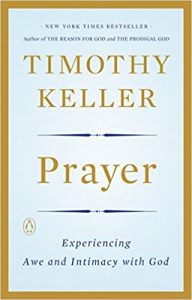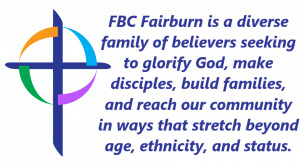Okay, for the second time in this list (and the second time in three weeks), we are covering a book on prayer. You probably have been told that prayer is the way we get to know God. I am sure you have heard sermons on prayer and you have probably sat in a church service where someone prayed from the heart. You may have even felt a little guilty that your prayers didn’t measure up or sound as genuine. Let me ask you a real, honest question…Have you felt stuck in your prayer life? I know that I have. Here is another question…Has anyone ever taught you how to pray?
That second question is one of the directions that Prayer: Experiencing Awe and Intimacy with God by Tim Keller takes. As great as the Hybels book on prayer that I referenced on July 2 is, Keller’s work on prayer is my go-to when someone wants to really know about prayer. Keller was the founding pastor of Redeemer Presbyterian Church in New York City, where he served until 2017, stepping down to focus on training the next generation of church leaders. If you have ever read Keller, you will know that he has a deep and abiding passion for the Gospel, for seeing the Cross shape lives, and training believers in new ways of being a disciple. This book on prayer is no exception to his normal mode of operation.
If we remember that we are supposed to be people of prayer, it is helpful to orient that around what prayer actually is. Believe it or not, our conviction about the nature of prayer will shape the function of prayer in our lives. Keller defines prayer as “a personal, communicative response to the knowledge of God…Prayer is seeking to respond and connect to that being and reality, even if it is no more than calling out into the air for help. That is, I believe, the common denominator of all human prayer. However, because our definition understands prayer as a response to the knowledge of God, it means that prayer is profoundly altered by the amount and accuracy of that knowledge.”[1]
This definition is especially informative about the way that you and I teach prayer in our prayers. In other words, my relationship with God will inform how I pray. My public prayer (whether public to my family or in church community) will be a demonstration of what I know and believe about God AND how that knowledge affects my life! This is why we teach children simple truths in prayer such as “God is great, God is Good. Let us thank Him for our food” as a simple blessing. It gives a strong baseline about what we know about God and our thankfulness to Him. But, as you and I grow as Christians, which according to Romans 8.28-29 is the predetermined plan of God for our lives, our prayers grow beyond “God is great, God is good” to be expressive of our relationship with Him. It also demonstrates how we can call out of our sinfulness to a God we do not yet personally know and He gives an ear to us, like in Jonah 3!
I had a church member ask me just last week about prayer and why we should pray if God is going to do His will either way. I explained it to him in terms of a marriage. He had been married for 55 years before his wife passed away. I asked him if his conversations with his wife at year 53 were the same as they were at year 2. Of course, he answered that they weren’t. When I asked him why, his response was, “Because both of us were different people. We had lived in the same house, but we became parents, we had jobs, we changed churches, and we were retired.” My next question was, “Would you say that your relationship grew over those years?” He answered that it had. So, I naturally asked him, “If you operated your conversations and marriage at year 53 based only on what you knew of your wife in year 2 of your marriage, would you have had a strong marriage?” His answer was what I anticipated, “Of course not. With each phase of our marriage, I learned more about her and loved her more. I miss her conversation more than anything.”
That is exactly why we must grow in prayer as we walk with Christ. Keller states it this way, “The clearer our understanding of God is, the better our prayers. Instinctive prayer is like and emergency flare in reaction to a general sense of God’s reality. Prayer as a spiritual gift is a genuine, personal conversation in reply to God’s specific, verbal revelation.”[2] I wonder if I go back to the question I posed earlier about feeling stuck in your prayer life, if I should ask the follow up question in this way: What have you been learning about the Person and nature of God that informs your prayer life? Our primary source of knowledge about God comes through His Word. Think of prayer like a response to His Word. That is how prayer works in the Bible. “The Word of God created within David the desire, drive, and strength to pray. The principle: God speaks to us in His Word, and we respond in prayer, entering into the divine conversation, into communion with God…Every time Christians merely remember who they are in Christ, that great word comes home to us and we will find, over and over again, a heart to pray.”[3]
Through the rest of the book, Keller examines biblical models of prayer and then does an overview of Christian authors that have developed great patterns of prayer. My recommendation of this book to you comes from two places. First, his definition of prayer is very poignant in helping shape our conviction about what prayer actually is. Second, through reading Scripture we find great encouragement from God’s Word on how to pray. I am convinced that our biggest problem as a Christian people is that we do not invest in prayer as God’s Word shows us to. Let me encourage you to dive deep into this book, gather your family, and devote yourself to prayer!
This book can be found on Amazon: https://tinyurl.com/ybqnnr99
[1] Timothy Keller, Prayer: Experiencing Awe and Intimacy with God (New York: Dutton, 2014), 45.
[2] Keller, 46.
[3] Keller, 64, 65

